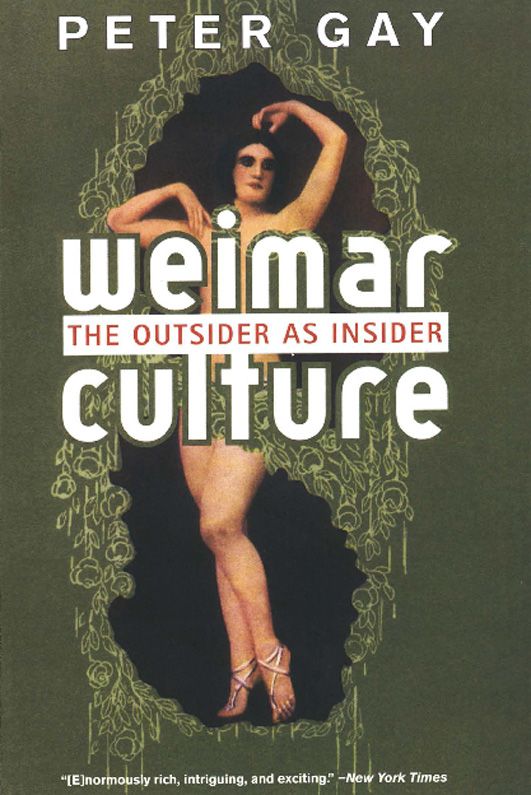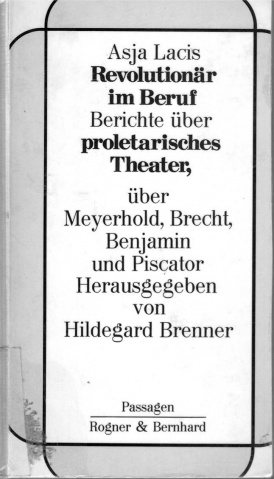Peter Gay: Weimar Culture: The Outsider As Insider (1968–) [EN, CR]
Filed under book | Tags: · 1910s, 1920s, 1930s, architecture, art, bauhaus, cinema, expressionism, film, germany, literature, modernism, music, nazism, philosophy, politics, psychoanalysis, theatre, weimar republic

First published in 1968, Weimar Culture is one of the masterworks of Peter Gay’s career. A study of German culture between the two wars, the book brilliantly traces the rise of the artistic, literary, and musical culture that bloomed ever so briefly in the 1920s amid the chaos of Germany’s tenuous post-World War I democracy, and crashed violently in the wake of Hitler’s rise to power. Despite the ephemeral nature of the Weimar democracy, the influence of its culture was profound and far-reaching, ushering in a modern sensibility in the arts that dominated Western culture for most of the twentieth century.
First published by Harper & Row, New York, 1968.
Publisher W. W. Norton, 2001
ISBN 0393322394, 9780393322392
205 pages
via chef
Review (Walter Laquer, The New York Times Books, 1968)
Review (Elizabeth Wiskemann, The Spectator, 1969)
Review (Sterling Fishman, History of Education Quarterly, 1970)
Weimar Culture: The Outsider As Insider (English, 1968/2001, EPUB)
Weimarksa kultura: Isključenik kao uključenik (Croatian, trans. Danja Šilović-Karić, 1999, added on 2014-8-3)
Asja Lacis: Revolutionär im Beruf, Berichte über proletarisches Theater, über Meyerhold, Brecht, Benjamin und Piscator (1971) [German]
Filed under book | Tags: · 1910s, 1920s, 1930s, avant-garde, experimental theatre, germany, theatre, weimar republic

A memoir of the theatre director, actress and pedagogue Asja Lacis follows her life and theatre work in revolutionary Russia and the Weimar Republic, and offers commentary on work and ideas of avant-garde artists and groups of the time. Lacis was a personal friend and collaborator of Walter Benjamin and Bertolt Brecht (whom she introduced to each other), Erwin Piscator and Bernhard Reich, among others. She was a primary influence in moving Benjamin to the Left. Along with Reich she was also responsible for making Brecht known in the Soviet Union.
Edited by Hildegard Brenner
Publisher Rogner & Bernhard, Munich, 1971
132 pages
via richardb
Review (Patty Lee Parmalee, New German Critique, 1975, in English)
The Writing of Asja Lacis (Susan Ingram, New German Critique, 2002, 19 pp, in English)
Commentary (Susan Ingram, 2003)
PDF (no OCR)
Comment (0)Walter Benjamin: Selected Writings, Volume 1: 1913–1926 (1996)
Filed under book | Tags: · aesthetics, language, literary criticism, literature, philosophy, translation, weimar republic, writing

“Walter Benjamin emerged from the head-on collision of an idealistic youth movement and the First World War, which Benjamin and his close friends thought immoral. He walked away from the wreck scarred yet determined “to be considered as the principal critic of German literature.” But the scene, as he found it, was dominated by “talented fakes,” so—to use his words—“only a terrorist campaign would I suffice” to effect radical change. This book offers the record of the first phase of that campaign, culminating with “One Way Street,” one of the most significant products of the German avant-garde of the Twenties. Against conformism, homogeneity, and gentrification of all life into a new world order, Benjamin made the word his sword.
Volume I of the Selected Writings brings together essays long and short, academic treatises, reviews, fragments, and privately circulated pronouncements. Fully five-sixths of this material has never before been translated into English. The contents begin in 1913, when Benjamin, as an undergraduate in imperial Germany, was president of a radical youth group, and take us through 1926, when he had already begun, with his explorations of the world of mass culture, to emerge as a critical voice in Weimar Germany’s most influential journals.
The volume includes a number of his most important works, including “Two Poems by Friedrich Hölderlin,” “Goethe’s Elective Affinities,” “The Concept of Criticism in German Romanticism,” “The Task of the Translator,” and “One Way Street.” He is as compelling and insightful when musing on riddles or children’s books as he is when dealing with weightier issues such as the philosophy of language, symbolic logic, or epistemology. We meet Benjamin the youthful idealist, the sober moralist, the political theorist, the experimentalist, the translator, and, above all, the virtual king of criticism, with his magisterial exposition of the basic problems of aesthetics.
Benjamin’s sentences provoke us to return to them again and again, luring us as though with the promise of some final revelation that is always being postponed. He is by turns fierce and tender, melancholy and ebullient; he is at once classically rooted, even archaic, in his explorations of the human psyche and the world of things, and strikingly progressive in his attitude toward society and what he likes to call the organs of the collective (its architectures, fashions, signboards). Throughout, he displays a far-sighted urgency, judging the present on the basis of possible futures. And he is gifted with a keen sense of humor. Mysterious though he may sometimes be (his Latvian love, Asia Lacis, once described him as a visitor from another planet), Benjamin remains perhaps the most consistently surprising and challenging of critical writers.”
Some parts first appeared in Gesammelte Schriften, Band I, Suhrkamp, Frankfurt, 1972
Edited by Marcus Bullock and Michael W. Jennings
Publisher Belknap Press, 1996
ISBN 0674945859, 9780674945852
528 pages
via Scribd.com
Review (J.M. Coetzee, The New York Review of Books)
Review (Eli Friedlander, boundary 2)
PDF (no OCR)
Comments (2)
